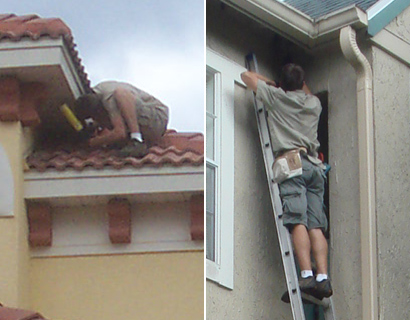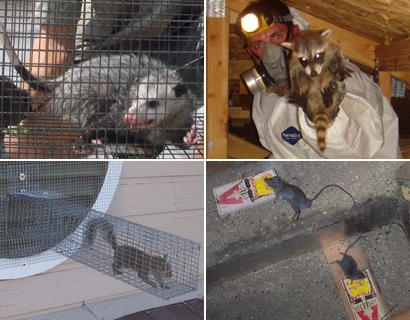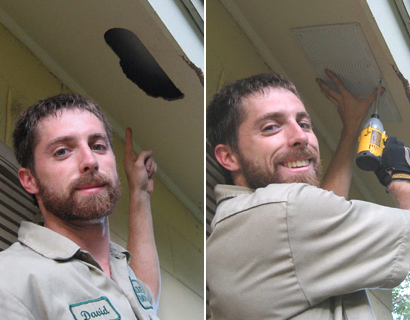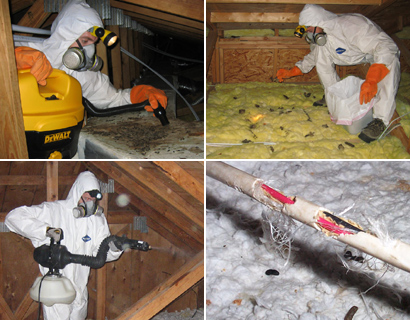- How We Solve Florida Wildlife Problems
How We Solve Melbourne Wildlife Problems
INSPECTION: Once on site, we will perform a full inspection of your home and property. This allows us to use the correct strategy and traps. If the animals are in an attic, a full building inspection is crucial, including the following:
- All ground-level areas, such as piper or A/C line entry & exit areas, A/C chase bottoms, ground-level vents, etc.
- All mid-level areas, such as dryer vents, siding gaps, first floor eaves or dormers, etc.
- We inspect the entire roof, including all plumbing stacks, ridge caps, vents, and other potential gaps or holes.
- We also inspect inside your attic, to identify animals and damage they have caused.
- If the animals are outside, we notice many subtle clues that will assist us in a successful strategy.
TRAPPING, EXCLUSION, REMOVAL: Once we understand what animal species we are dealing with, and the problem, we use the most effective means of removing the animals. We use dozens of different types of traps.
- Trapping - If trapping the animal(s) in live cage traps, trap type, set, and location are crucial to success.
- Exclusion - Oftentimes, we are able to simply set one-way doors or other exclusion devices that allow the animals inside a building to safely exit, but never get back inside.
- Removal By Hand - Sometimes we actually remove animals by hand, or with special tools like snare poles.
- The Law - In all cases, we obey state and local laws regarding wildlife, but aim to take the most humane approach.
ENTRY HOLE REPAIRS: Repairs are a crucial step in the wildlife removal process. In many cases, such as bat or rodent control, the job cannot be performed without detailed repairs, and in all cases, sealing the entry holes shut ensures that no future wildlife will ever enter your home.
- 100% of the entry holes must be found, and sealed shut, or the job is not complete.
- Our repairs are professional contractor grade, look good, and when applicable we use steel, which rodents such as rats or squirrels are unable to chew through.
- We give a written guarantee on our repairs against any future animal entry.
ATTIC DECONTAMINATION SERVICES: It may be desirable to clean your attic after we've removed the animals. They can leave behind large amounts of droppings, urine, hair, oils, food, nesting material, and so on. These remnants can attract insects like cockroaches, and the scent left behind can encourage new animals to chew their way into your house. You might experience odor problems from the waste. It's possible that mold will grow on waste areas.
- We remove or vacuum all droppings, or remove all the soiled insulation.
- We fog the attic with a special enzyme-based cleaner that destroys any organic matter and deodorizes the space.
- We repair damage, such as ductwork, electrical wires, pipes, insulation, and more.
Melbourne has the typical two season climate commonly found in humid subtropical climates – a hot and wet season. This is a prime factor in why our Melbourne wildlife likes to use our homes (whether in or under) for refuge from some of our extreme climate. The damage they can cause can be severe in some cases from chewed wires to heath issues from their droppings. We answer our phones 24/7 to better help you with your Melbourne wildlife needs. We service the greater Melbourne area, including the following cities: Cape Canaveral, Indian Harbour Beach, Satellite Beach, West Melbourne, Grant-Valkaria, Indialantic, Malabar, Melbourne Village, Palm Shores, Palm Bay, Rockledge, Titusville, and Cocoa Beach. We also service the following counties: Volusia County, Indian River County, Osceola County, and Orange County.
Other Melbourne animal pest control topics:
Property Modifications to Deter Rats
Is it Legal to Trap an Armadillo
Homeowner's Insurance VS. Bat Damage
Well Repellants Work For a Raccoon in a Chimney
To learn more about our services, visit the Melbourne wildlife control home page.
This month's wildlife how-to article: Should I ever poison a skunk?
Should I ever poison a skunk?
There are many reasons you must not make an attempt to poison a skunk, first of all , legal issues relating to the killing of skunks forbids such methods of killing, thus you may be fined or even risk going to jail for such things. Secondly, it is inhumane to kill a skunk with a poison, because it inflicts internal pains and injuries to the vital organs of the animals (most especially the kidney, liver and heart). It is better to use human methods such as trapping to kill a skunk.
Secondly, poisoning a skunk can lead to environmental problems. A skunk may not be killed immediately by a poison. Depending on the concentration of the poison, it may take between few seconds and even days to get a skunk killed by the poison and since skunks are always active, they may die somewhere else and their blood may contaminate the environment, including streams and gardens. Some animals that feed on dead animals may also feed on poisoned skunks and in the process get infected with rabies, or bacterial infection which they can transfer to humans or other animals through scratches and bites.
Poisoning skunks may be dangerous to your pets. If you use poisoned baits such as dog or cat food for instance, your pet or pets from nearby houses may pick up such foods and consume them, and in the process get poisoned. The use of poisons for skunks has been banned in several countries because of issues of getting other animas killed in the process. In some countries such as UK and US, poisoning of skunks is considered to be the same offence as using wild animals to hunt skunks.
The best alternative to poisoning of skunks is the use of traps; these could be one or two-door traps, snap traps or any other lethal traps. Traps are humane and they do not kill the skunk instantly, rather they hold the animal until it is transferred into another cage or cardboard boxes where it can be released several miles away from the residential area. Snap traps may eventually choke a skunk to death but it doesn’t make you go against the law because the animal was killed within your premises, however, it is against the law to trap a skunk outside of your residential premise. The use of baits along with traps has been found to be the most effective way to capture and kill skunks.





